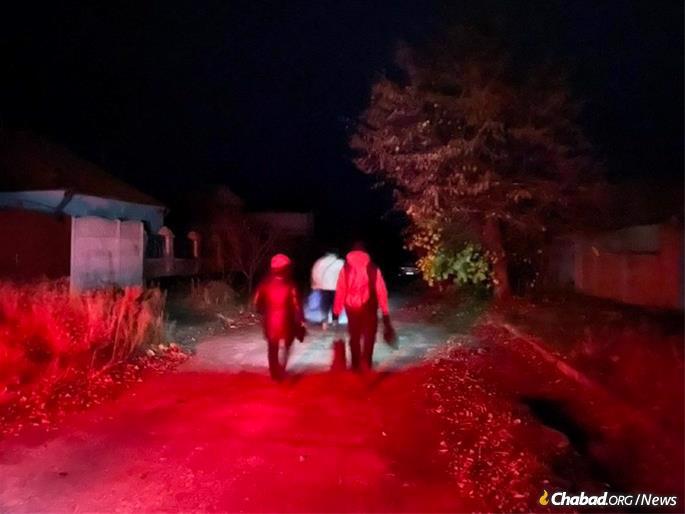
Urgent Relief to Freezing Ukrainians Plunged Into Darkness
by Faygie Levy Holt – chabad.org
A massive wave of airstrikes targeting power grids around Ukraine plunged much of the nation into darkness Wednesday. From small villages to big cities, people are hunkering down and trying to cope as best they can in the freezing-cold darkness, often without running water.
“There is a total blackout here with no water and no heat,” said Miriam Moskovitz, who along with her husband Rabbi Moshe Moskovitz, has been leading Chabad-Lubavitch of Kharkov for some 30 years. She was able to speak briefly with Chabad.org as Chabad’s Choral Synagogue has some power thanks to electric generators recently secured by Rabbi Moscowitz with the help of the Jewish Relief Network Ukraine (JRNU), Chabad’s unified effort for wartime humanitarian work in Ukraine. Chabad’s on-the-ground network is directed by Chabad-Lubavitch emissaries throughout Ukraine who have hundreds of staff in 32 cities and 100 villages providing assistance to those devastated by the conflict.
Since the start of the war, Chabad emissaries have brought massive amounts of humanitarian aid to their communities while helping tens of thousands out of the war-torn country.
“It’s like at the beginning of the conflict, but even worse because now there’s no power and no cell service,” Judi Garrett, chief operating officer of JRNU tells Chabad.org. “People are in the dark and they can’t get gasoline,” which is essential to run generators and reach people in even more dire need. “The crisis level has been escalating for a couple of weeks, and today hit the high point with no power anywhere with snow falling and freezing temperatures in the 20’s,” she added.
Urgent Meetings to Provide Additional Aid
News from Chabad emissaries and their staff throughout Ukraine has been sparse as of press time as a result of the widespread power outages. Despite very limited means of communication, here are some reports describing conditions on the ground today:
In Dnipro, Chabad’s Menorah Jewish Cultural Center, which has a generator and has been a beacon of aid for internally displaced Jews and non-Jews since the start of the war, continues to be used as a shelter for the elderly and most vulnerable. There is, at the moment, a pressing need for flashlights, portable stoves and bedding. They also need gasoline because there are no working gas stations.
In Kropyvnytskyi, there is no electricity and no phone service. The Chabad emissary there has been going door-to-door to find out what specific items—food, water, batteries, medicine—each family needs.
In Odessa, the city has completely shut down as there will be no power for at least the next day or two.
While some Chabad emissaries and staff on the ground could be reached after the power went out, some could not because cell service is being impacted as well.
“There are millions of people, including as many as 100,000 Jews, still in Ukraine, and I think that gets forgotten,” said Garrett. “People think everyone left, but not everyone can. Some, especially the elderly, do not want to leave. Most men between the ages of 18 and 60 are forbidden to leave the country, and many of their wives don’t want to leave them behind. We need to help them all.”
Those that are trying to leave now are discovering that they can’t because with the power out documentation can’t be checked, leading to hours-long waits at border crossings.

Chabad Emissaries and Staffs on Front Lines of Aid
Chabad emissaries and their staff have been working since day one to ensure that people have the most-basic supplies, especially food and water.
“Chabad has hundreds of staff who have been working in Ukraine for a long time and have switched from being social-service providers to humanitarian-aid workers,” said Garrett. “It is exhausting, it’s grueling and it is taking its toll on everybody because not only are they working hard to help others, but they are also worried about themselves and their families. They have been doing this for ten months straight.”
For those who are outside Ukraine and want to help, Garrett said the most critical need is for more financial donations.
“I know it’s tacky to ask for money, but honestly that’s what’s needed. Every dollar we get goes right out. If someone donates $100 we can use it to buy fuel, blankets, etc. We are shipping 105 pallets of clothing by air to Ukraine tomorrow, but it will take a week to get there.”
And given the power outages and dire conditions, she said, “We need to be able to buy more stuff right now!”
Donations can be made at the JRNU web site.














